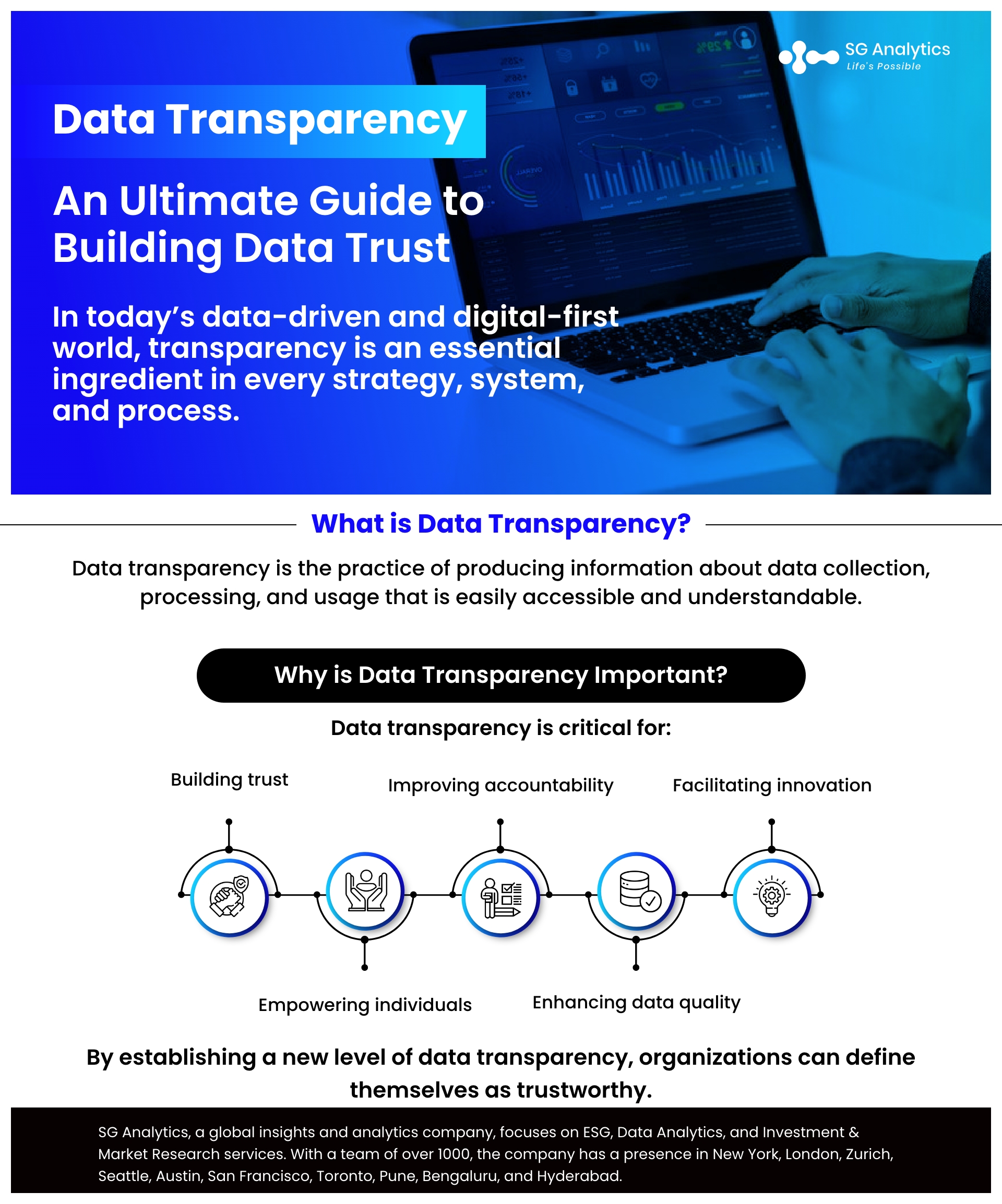In today's data-driven and digital-first world, transparency is an essential ingredient in every strategy, system, and process. Transparency is tangible and the best stepping stone possible for organizations to achieve company-wide data trust. Organizations investing in artificial intelligence (AI) or machine learning (ML) are rethinking and prioritizing trust and transparency strategies within their operations. It is vital for industry leaders to integrate new data and privacy laws within their organizations and establish higher levels of trust in data.
Transparency is hard to achieve and mandates directed efforts. It is critical to enable organizations to find the data they require and understand the context behind it. To do so, organizations need to integrate hard-and-fast data policies and foster a company culture of trust.
In today's changing landscape, where businesses and consumers are bombarded with new insights every day, it is hard to identify whom to trust. Consumers, employees, and business leaders make decisions based on data insights without considering the process behind the numbers. Attesting to data validity helps in building trust. With heaps of data being collected and processed at an unprecedented rate, there is a growing concern about data privacy and security. Due to this reason, data transparency is emerging as a key strategy for promoting trust and accountability.

And with data-driven capabilities exploding the trust and transparency gap is growing rapidly. However, businesses and tech companies around the globe are slowly striving to take control of their data transparency and privacy agenda.
Read more: How are Organizations Creating and Cultivating a Data-Driven Culture?
What is Data Transparency?
Data transparency is the practice of producing information about data collection, processing, and usage that is easily accessible and understandable to the individuals from whom the data is collected or used. The process involves offering clear insights about how data is used, who has the authority and access to the accumulated data, and the purpose of the data.
Data transparency is considered an important component in building data trust as it enables individuals as well as organizations to make informed decisions about their personal data while enabling them to build data trust. Additionally, data transparency is a key component of data privacy and data protection. It further enables organizations to exercise their rights over their personal data, like the right to access, rectify, or delete their data.

Why is Data Transparency Important?
Data transparency is critical for several reasons, including:
-
Building trust: When individuals are aware of how their data is being collected, used, and protected, they are likely to trust the organizations that accumulate and handle their data.
-
Empowering individuals: Data transparency helps individuals in making informed decisions related to their personal data, allowing them to exercise their rights over their data.
Read more: Data as a Growth Enabler: Finding the Real Purpose of Data
-
Improving accountability: Data transparency fosters accountability, thereby making it easier for individuals to identify who is responsible for data collection and use. It also provides a way to hold them accountable if the data is misused or mishandled.
-
Enhancing data quality: When data is transparent, it is easier to identify inconsistencies in the data, which further helps in improving the accuracy and quality of data.
-
Facilitating innovation: When data is transparent, it can help in developing new data solutions to drive innovation and economic growth.

Data transparency is critical for data privacy and data protection. It further helps in ensuring that individuals have control over their personal data and that organizations are held accountable for how they collect, use, and protect it.
Establishing Data Transparency and Trust in Business Model
Establishing data transparency in an organization is cumulative. New trust reporting frameworks assist with oversight of data processed within the operational ecosystem. That further helps in supporting an organization’s digital transformation investment, thereby building trust in the brand.
Many and many organizations are conducting data operations with a level of interoperability that did not exist in the past. Delivering accurate information can be out of their hands. Companies, for instance, have no way of identifying if the collected information is relevant or accurate. And boards, customers, and business partners are voicing out their concerns to establish more transparency, thereby compelling businesses to employ an extra set of eyes.
With data systems becoming more complex, organizations are adapting their operational frameworks in a way that helps in gaining and embedding trust across the ecosystem.
Read more: How are Organizations Benefiting By Turning Data into Purpose?

Misconceptions about Data Transparency
With companies growing, they are investing more and more in democratizing and operationalizing data. Stakeholders are gaining access to data leading to the creation of more data projects. This has resulted in the data warehouse becoming hard to navigate. And with more and more people gaining access to the accumulated data sets, there is a need for establishing reliable information sources. To earn access to consumers’ data, organizations need to offer value in return. And building trust is an essential facilitator.
With the explosion of digital technologies, organizations are sweeping up vast data quantities about consumers’ activities. While some organizations are open to incorporating these data practices, many are keeping consumers in the dark, choosing control over sharing. A firm that assists clients in creating products and services by leveraging users’ personal data incorporates a shrouded approach to data gathering.
There are many common misconceptions related to data transparency. They are as follows:
-
Data transparency is expensive
-
Data transparency is time-consuming
-
Data transparency is for public-facing organizations
-
Data transparency gives away trade secrets
These misconceptions can help prevent organizations from reaping the benefits of data transparency. However, it is equally important for them to address the growing misconceptions through education and awareness-building.

Establishing data transparency processes can often be tricky if the organization has just started exploring the world of data. In such a scenario, consistency is the key to successfully managing data transparency and trust. By establishing internal processes to collect, store, and use data, organizations can reduce the chances of information being lost or corrupted.
Read more: The Ultimate Guide: How will Data Analytics Transform the Insurance Industry in 2023
Conclusion: The Future of Data Transparency
Establishing data transparency in an organization is an ongoing process. This transparency should not stop at the initial request stage. They can build data transparency throughout the entire relationship.
Organizations today are exploring ways to adapt to these ongoing changes by incorporating a culture of transparency that will help them position themselves to grow further in this evolving landscape. The future of data transparency will be shaped by several trends, technologies, and regulatory factors, such as:
-
Decentralized data systems
-
Use of AI and machine learning
-
Significant regulatory oversight
-
Continued emphasis on data privacy
-
Advances in data visualization and analytics

By establishing a new level of data transparency, organizations can define themselves as trustworthy.
With a presence in New York, San Francisco, Austin, Seattle, Toronto, London, Zurich, Pune, Bengaluru, and Hyderabad, SG Analytics, a pioneer in Research and Analytics, offers tailor-made services to enterprises worldwide.
A leader in Data Analytics, SG Analytics focuses on leveraging data management and analytics, and data science to help businesses discover new insights and build strategies for business growth. Contact us today if you are looking to make critical data-driven decisions to prompt accelerated growth and breakthrough performance.









